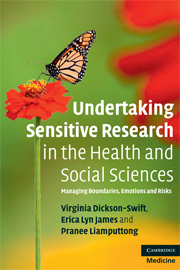 Undertaking Sensitive Research in the Health and Social Sciences
Undertaking Sensitive Research in the Health and Social Sciences Book contents
- Frontmatter
- Contents
- Preface
- Acknowledgements
- About the authors
- 1 What is sensitive research?
- 2 Doing sensitive research: methodological, theoretical, ethical and moral perspectives
- 3 Conducting a sensitive research project
- 4 Managing boundaries in sensitive research
- 5 Emotions and sensitive research
- 6 Managing risks and ethics in research
- 7 Implications and recommendations for researchers
- References
- Index
Preface
Published online by Cambridge University Press: 11 September 2009
- Frontmatter
- Contents
- Preface
- Acknowledgements
- About the authors
- 1 What is sensitive research?
- 2 Doing sensitive research: methodological, theoretical, ethical and moral perspectives
- 3 Conducting a sensitive research project
- 4 Managing boundaries in sensitive research
- 5 Emotions and sensitive research
- 6 Managing risks and ethics in research
- 7 Implications and recommendations for researchers
- References
- Index
Summary
The impetus for this book came from the experiences Virginia had while undertaking a small qualitative project that investigated the impact of gambling on spouses and partners (Dickson-Swift, 2000). Gambling is a sensitive topic, and undertaking research on sensitive topics raises a number of particular methodological and ethical issues for both the participants and the researchers. When Virginia began interviewing the spouses and partners of gamblers it became clear that many of the participants who volunteered to be interviewed had not told their spouse or partner about their participation in the research study. For many of the participants, this interview was the first time that they had spoken to anyone at length about their partner's gambling and the effects that it was having on both them and their families. Many reported that participation in the research interview had forced them to think about the consequences of their partner's gambling.
Undertaking gambling research in a small town proved to be quite challenging. Virginia was not immune from the stigma that is often attached to those who have partners or family members who gamble. Many people wondered how Virginia came to be interested in gambling research that focused on the issues for spouses and partners. After the advertisements for potential participants were printed in the local paper, people began to speculate about her interest in such a topic.
- Type
- Chapter
- Information
- Undertaking Sensitive Research in the Health and Social SciencesManaging Boundaries, Emotions and Risks, pp. ix - xiPublisher: Cambridge University PressPrint publication year: 2008


